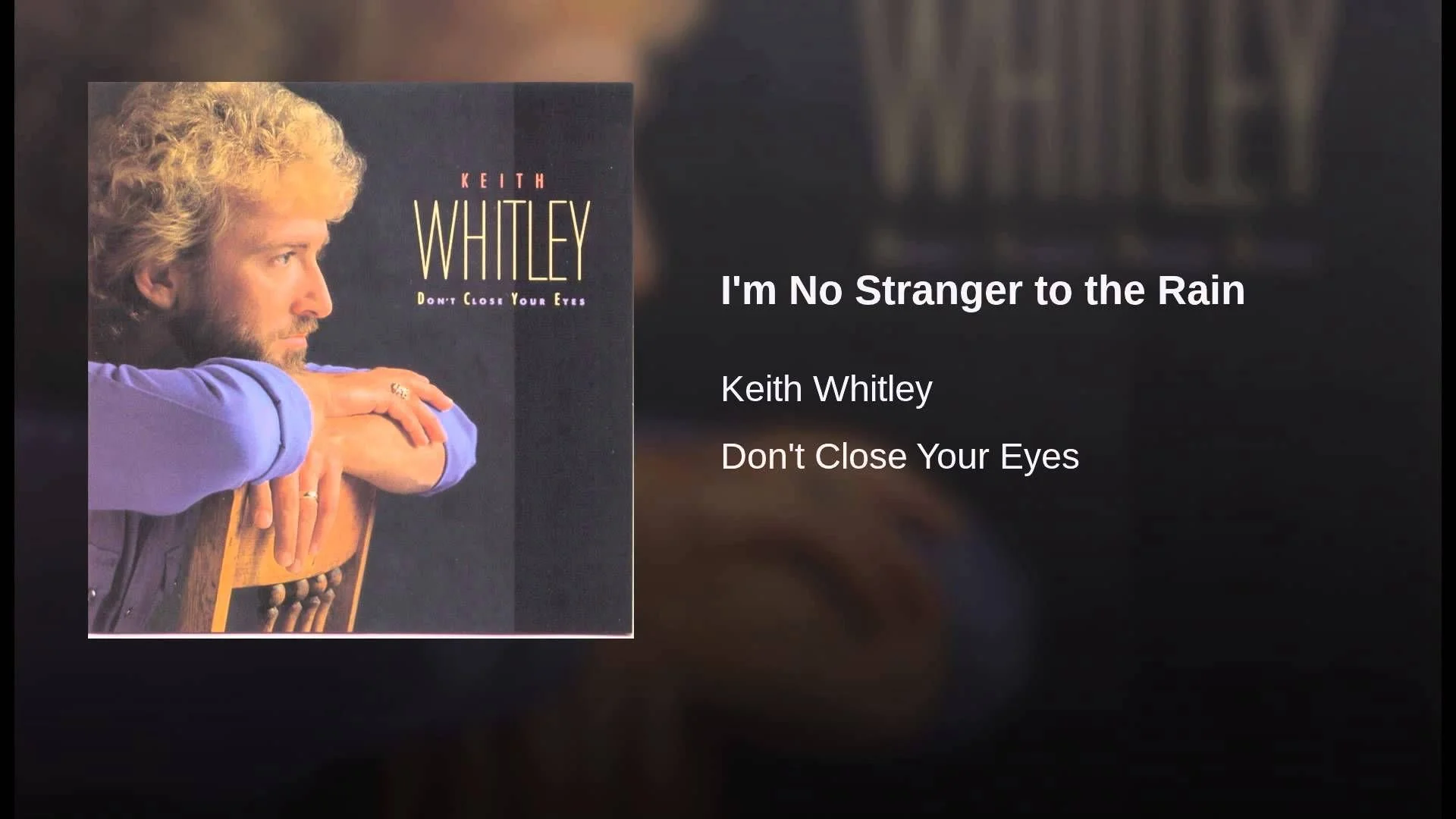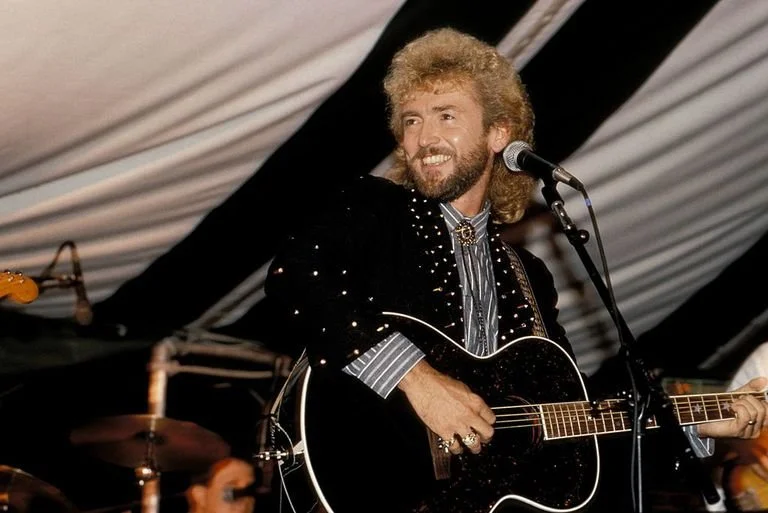P.J.’s Ultimate Playlist #8: “I’m No Stranger to the Rain” by Keith Whitley
Like I said in my review of “Try That In a Small Town,” it’s hard being a country music fan nowadays. I go into more detail in that article about why, but the TL;DR is that while I still hold a lot of nostalgia for the genre because it was the main type of music my family listened to while I was growing up, I’ve become increasingly alienated from it in recent years as my leftist politics have diverged from Music Row’s inherently traditional outlook. And when you combine said traditionalism with country music’s numerous ties to the American South, with its long history of racism and misogyny, you get a very toxic combination. Indeed, except for Chris Stapelton, many of my favorite country artists from the last 20 years are ones that mainstream country radio barely touches (Tyler Childers, Cody Jinks, Colter Wall, William Elliot Whitmore, Jason Isbell, the Drive-By Truckers, etc.).
But there are plenty of diamonds to be found under all the bro-country sludge and patriotic blatherskite that make up most 21st-century country songs, including some from far back in the genre’s history. The one we’re talking about today is an example of country music at its best, one that explores significant and universal themes while still grounded in a small and charming rural outlook.
So let’s talk about it.
The Artist
You heard I’m drinkin’ more than I should and that I ain’t been looking all that good. Someone told you I was taking it rough. Why’re they making those stories up…when I’m over you?
Jackie Keith Whitley was born on July 1, 1954, in Ashland, Kentucky, the hometown of fellow country music stars Billy Ray Cyrus, Naomi Judd, and Wynonna Judd (and Charles Manson, but that’s not important now). He would grow up in nearby Sandy Hook, however, where his mother and father worked as a newspaper editor and an electrician, respectively.
Despite Elliot County being a dry country, Whitley and his teenage friends quickly developed an affinity for bootleg bourbon and racing cars down mountain roads. Disaster soon struck when a vehicle Whitley and a friend were in wrecked while attempting to round a curve at 120 mph. The friend died, and Whitley only narrowly escaped getting his neck broken. This wouldn’t be the end of the Whitley family’s history of car accidents. Whitley himself broke his collarbone after driving his car off a 120-foot drop into a frozen river, and his older brother Randy died in a motorcycle accident in October 1983.
Keith’s involvement in the music industry began in 1969 when he entered a local music contest alongside his brother Dwight and his best friend, future bluegrass superstar Ricky Scaggs. Bluegrass legend Ralph Stanley discovered the two the following year when he stumbled into a bar in Fort Gay, West Virginia, where Whitley and Skaggs were performing. He invited them to join his backing band, the Clinch Mountain Boys, to which the two readily agreed.
After performing with them and J.D. Crowe and the New South for the next decade or so, Whitley decided to set out on his own, moving to Nashville, Tennessee, and signing a record deal with RCA. Critics derided his debut E.P., 1984’s A Hard Act to Follow, as erratic and inconsistent. His debut album, 1985’s L.A. to Miami, fared better, producing the top 20 single “Miami, My Amy” and the songs “On the Other Hand” and “Nobody In His Right Mind Would’ve Left Her,” which became hits for Randy Travis and George Strait, respectively.
After an abortive attempt at a second album, the recordings of which Whitley shelved for not being up to his standards, Whitley would create what many consider his masterwork, May 1988’s Don’t Close Your Eyes. The album spawned three #1 singles in the form of the title track, “When You Say Nothing At All,” and “I’m No Stranger to the Rain.” Whitley soon became Nashville’s newest superstar and was set to join the Grand Ole Opry in May 1989.
Sadly, it all came crashing down on the morning of May 9, 1989, when Whitley’s alcoholism finally got the better of him. He had been planning a golfing trip with his brother-in-law that day, after which he planned to write songs for him and his wife, fellow country singer Lorrie Morgan, to duet on. Whitley’s brother-in-law found him unresponsive on his bed, and he was pronounced dead on arrival at the hospital from alcohol poisoning at the far too young age of 34.
The Song
In light of how it all ended, the lyrics of “I’m No Stranger…” can seem bitterly ironic to anyone in the know. Take the triumphant imagery of the first verse, for instance:
I’m no stranger to the rain.
I’m a friend of thunder.
Friend, is it any wonder lightning strikes me?
I’ve fought with the devil,
Got down on his level,
But I never gave in,
So he gave up on me.
According to Songfacts.com, the last four lines of the verse are what convinced Whitley to record the song as, in his words, “I could really identify strongly with that line.” Unfortunately, though, I imagine in this scenario, the devil was merely pretending to surrender while muttering, “I’ll get you next time, Whitley! Next time!” under his breath.
Whitley continues with the second verse:
I’m no stranger to the rain.
I can spot bad weather
And I’m good at finding shelter in a downpour.
I’ve been sacrificed by brothers,
Crucified by lovers,
But through it all,
I withstood the pain.
I’m no stranger to the rain.
Then comes the bridge, where hints of doubt begin to creep in, and Whitley seems to question whether or not he’s kidding himself:
But when I get that foggy feeling
And when I’m feeling down,
If I don’t keep my head up, I may drown.
But it’s hard to keep believing
I’ll even come out even
While the rain beats your hope into the ground,
And tonight, it’s really comin’ down
The optimism starts to return a little bit with the third verse:
I’m no stranger to the rain,
But there’s always tomorrow
And I’ll beg, steal, or borrow a little sunshine,
And I’ll put this cloud behind me.
That’s how the man designed me;
To ride the wind and dance in a hurricane.
I’m no stranger to the rain.
Oh no, I’m no stranger to the rain.
Then comes a short instrumental break featuring quick solos from the electric guitar, bass, piano, and pedal steel guitar in quick succession. Then Whitley sings the last verse, which combines the first three lines of verse one and the second half of verse three, with the song ending at three minutes and thirty-seven seconds.
I know I didn’t spend much time actually interpreting the lyrics like I did with the other songs I’ve covered for this series, but I don’t feel like I need to. Like many of the best country songs, it’s direct and blunt with its message while remaining conversational and sharing deep and complex themes.
Personal Thoughts
I feel like I would be remiss if I didn’t share this quote from Ron Hellard, who co-wrote the song alongside Sonny Curtis of Buddy Holly and the Crickets fame (who also wrote such timeless classics as “I Fought the Law” and the Mary Tyler Moore Show theme). In a 2015 interview with Dave Paulson of The Tennesseean, Hellard claimed that the song had no meaning to him for several years:
Then I went through some hard times. I lost my dad. That was devastating to me because my dad hung the moon, and I've got the paperwork to prove it. I almost didn't get over that for a long time. I happened to turn on the radio, and there was "I'm No Stranger to the Rain," and I realized what the song was about then. It was a song about redemption, really. "I'll put this cloud behind me/ That's how the man designed me." It was like coming back 20 years later and patting yourself on the back, saying "It's going to be OK." You're talking to yourself, really.
I couldn’t put it better myself. For such a simple-sounding song, its lyrical themes of hope, mental health struggles, and the resilience of the human spirit give it a timeless, even mythical feel, especially with the lines about wrestling with the devil and dancing in a hurricane.
Indeed, it feels like a message that’s particularly relevant to me now, between my not feeling any motivation to pursue my creative writing projects and witnessing death and destruction everywhere I look in this decaying world, what with the genocide in Gaza and the worsening effects of anthropogenic climate change. On top of all that, my paternal grandmother, who has been suffering from Parkinson’s disease for several years, was recently hospitalized for pneumonia, and I know it’s only a matter of time before one of these new health scares does her in for good.
Through it all, though, I know there’s a tomorrow to look forward to, and surrendering to the doomer mindset will not do me any good. There is plenty of joy to be found in this world, whether it’s a favorite song or movie or with friends, family, pets, or the great outdoors. So go out there and “beg, steal, or borrow a little sunshine” before the rain starts coming down again.
And I’ll end this little essay by saying…thank you, Keith Whitley. You may not have been able to keep your head above water in the end, but I’m sure there are a lot of people who have thanks to this song.
The smile on your face lets me know that you need me. There’s a truth in your eyes that says you’ll never leave me. A touch of your hand says you’ll catch me if ever I fall. Now, you say it best…when you say nothing at all.


